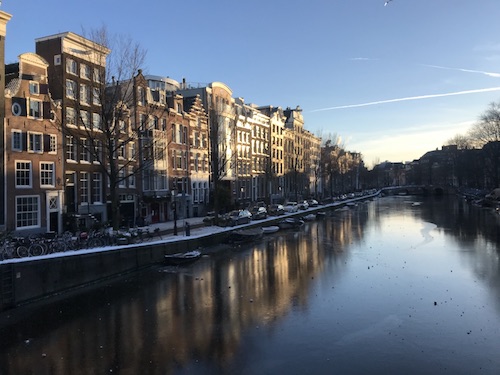Table of Contents
Where I started- burned out in public schools
If you’ve been a public school teacher in the U.S. like me and ever thought about living abroad, it’s time to spend a couple of years teaching internationally. I taught public school in San Francisco for four years. During that time, I had 35 students in a class, and up to 8 students with serious special needs. I had zero prep time: the kids were with me the entire day, including P.E., art, and everything else. I believe in public schools, and I love my home town of San Francisco. It was wonderful teaching in the city I grew up in.
But I also couldn’t continue the way I was living. I was living with my parents, which was lovely, but I couldn’t live with them forever, and I also couldn’t imagine spending half my salary on rent. Since I didn’t have any prep time, I did all my planning on nights and weekends- and I was getting more and more exhausted from working all day every day. Having a class of 35 kids, I didn’t feel like I could help any of them as much as they deserved. So many of my students needed 1:1 support, and I couldn’t give it to any of them.
I was burned out. I thought I’d either have to leave teaching altogether, or find a completely different way of teaching.
International teacher friends helped me
During my 4th year, one of my friends from my master’s program told me about her job as an international teacher in Brussels, Belgium. A colleague from my school in SF told me about her new life teaching internationally in Morocco. Both of them had class sizes capped at 20. In the younger grades, both of them had a full time teaching assistant. Both had actual art, music, and P.E. teachers at their schools- so they had at least an hour of prep time every day. Teaching internationally sounded so wonderful! I’d always loved traveling. It sounded like a way to combine being able to teach in excellent working conditions with having a new adventure.
How to become an international teacher
I asked my international teacher friends how to get started, and they both mentioned a database called Search Associates. Search Associates has two different useful parts:
- Job fairs: I went to the San Francisco job fair, and that’s how I got my first international teacher job- 3rd grade in Sri Lanka in South Asia! I had never considered Sri Lanka before attending the job fair, but I was able to interview with the Head of School in person, and do an online interview with the principal the next day, and had a job offer that week. You can see the schedule of job fairs here.
- Database of job openings: Here you can see many helpful data points- which schools have openings, the demographics of the students and teachers, salaries, benefits, and contact information. Many jobs will allow you to apply directly through the website, and nowadays you might be able to interview online without having the expense of attending a job fair in person. If a job fair is convenient for you, I’d still recommend going in person to make connections, hear the sales pitches of schools you might not have otherwise considered, and do any in-person interviews you can. But if the job fairs are really far away for you, you might be able to do everything online.
I used Search Associates to get my first international teacher job in Sri Lanka, and again to get my current job in the Netherlands. But there are competitors, which might have a job fair more convenient for you or be cheaper to join, like Schrole and TIE.
If there’s a particular country you really want to move to, you can also Google international schools in that one country, go to those schools’ websites, and try to apply directly to those schools. It will be much harder to find a job if you keep it that narrow though, so I would recommend keeping your options as broad as possible. If you can be open to teaching anywhere in the world, you’ll have many more good options!

Photo credit: Erika
Why you should try teaching internationally
- You get to live in another part of the world! I spent two years living in Sri Lanka, exploring all over south and southeast Asia. Then I’ve spent the last 6 years living in the Netherlands, traveling all over Europe. It’s far cheaper to explore a region when you’re living in that region. While when I was living in San Francisco, it was affordable and easy to explore around California. That same distance from Amsterdam now includes Italy, France, Germany, Switzerland, Austria, Belgium, Luxembourg, and many more! A three-hour train ride takes me to Paris! From Sri Lanka, I went to India four times and the Maldives four times, both an hour flight away. I’d never been in Asia before signing the two-year contract in Sri Lanka, but from there I got a home base to explore an entirely new region. Where do you want to explore?
- You have far better working conditions than back home. Class sizes are normally capped at 20, you might have an assistant teacher, there should be real P.E., art, and music teachers, and maybe drama, additional languages, English specialists, special needs teachers, and other help. That means you have significant prep time- you can get your prep done during the school day!
- You have extra benefits– roundtrip flights home for your whole family 1x a year or every other year, housing allowance or even free housing for your family, free tuition for your children at these fancy schools, moving allowance to cover the costs of shipping everything, healthcare and pensions, and possibly more. You should definitely check to make sure you get these benefits before signing any contract. In Sri Lanka, I got a roundtrip flight every year, a free 3 bedroom apartment just for me, free shipping, and I would have gotten free tuition if I’d had any children. In the Netherlands, I get free roundtrip tickets for my family every other year, and I got a housing allowance my first two years to help cover the costs of a deposit at a new rental, and free shipping. The tuition is free for any children, but a taxed benefit here in Amsterdam. Western Europe and the U.S. have the fewest benefits. Most of the rest of the world has free housing, which means your saving potential is enormous. Salaries are lower, but the cost of living is far, far lower. You might even be able to afford household help. In Sri Lanka, everyone had a full time housekeeper. That means no grocery shopping, cooking, cleaning, laundry, or other errands. Especially if you have young children…imagine how much more time you’d have with them!
- You can save a huge amount living abroad- or pay off debt. With free housing and low or zero taxes, there are many places in the world you can teach while getting a good salary- and have no housing expenses. That means whatever you make is yours to use- to save, to pay off student debt or credit card debt, or travel. You’ll probably have enough to do both if you teach in the Middle East or China. In Sri Lanka, while my salary was lower than I was making in San Francisco, since I didn’t have to pay for housing and it wasn’t taxed, even though I traveled a lot I was still able to save a lot as well.
- If you don’t love teaching internationally, you can always move to another country or back home. International teaching contracts are normally two years. It’s a good amount of time, since the first year everything is so new and exciting- and can also be frustrating as you adjust to a new culture. By the second year, you’ll know much better how the school works and how to live in your new country, and be able to enjoy it properly.

Photo credit: Erika
What do you need to become an international teacher?
In general, you need a teaching credential. You don’t need a master’s, though it will help and might get you a bit more money. There are some schools that won’t need a teaching credential either, and you can filter for that on any teaching database you use, though most will. A few years’ teaching experience is useful too, though again some schools won’t require it. Some countries have specific requirements, like only hiring teachers under 55 or 60, or requiring at least 5 years teaching experience, but that will all be clear in their job description.
If you’re a teacher or right out of a teaching program, you can find a job. If you’re right out of college, some schools will also hire you. Go for it!

What if I’m afraid? What about my family and friends?
I was terrified when I signed that first contract to go move to Sri Lanka for the next two years. I’d never been to Asia before, and there I was signing a contract to spend the next two years there! It was not an easy decision, and I was very nervous.
On the other hand, I’d always thought about living abroad. At the time, I was single. What if I met someone and he didn’t want to live abroad? I couldn’t keep on teaching the way I had been in San Francisco. I needed a change, and I needed to try out teaching abroad. I thought if it didn’t work out, if I really didn’t like it, I could always come back to San Francisco.
If I had never tried, I would have always regreted that. I thought what would I think if I get to be 80 years old: would I regret having tried, or having never tried? For me, I had to see for myself what living abroad as an adult would be like. After two years, I could always come back home.
My parents, brother, and old friends are still in San Francisco, which is hard for me. Every summer, I always come back for at least 4-5 weeks. I come back most winter breaks for another 2-3 weeks. When I’m back, I stay with my parents, and I see my people for much longer periods of time than when I lived here: normally lots of daylong events.
If I add up all the hours I spend with my friends and family, it’s not necessarily less than I would have if I were living back in San Francisco. When I’m here for a limited time, people generally make more time for me than they would if we were all here all the time and all busy working.
FaceTime is also a wonderful invention, and helps a lot. If you have friends or family who can travel, they’ll love visiting you when you have a new place to show them around!

Why you should become an international teacher
It’s possible you’ll want to come back home after two years. But it’s far more likely that you’ll never look back- that you’ll spend the rest of your life exploring the world. Maybe you’ll fall in love, like I did in the Netherlands, or my friend did in Morocco (she now has two children and is still living there).
Maybe you’ll start in the Middle East to pay off your student debt, like another colleague, but realize that there are so many other ways of living that have many advantages to living in the U.S. Maybe you’ll realize you no longer have to worry about the cost of childcare, healthcare, housing, or debt, and never want to go back to that financial stress.
Maybe you’ll realize, like I did, that you can finally enjoy teaching again once you have prep time and smaller class sizes. So go for it! You’ll never know what you didn’t try. If you have any questions or want to talk more about taking the leap with me, leave me a comment below. You can do it!

Of course, if you want tips on what to do in Amsterdam or in San Francisco, please check out my articles about them. Bit by bit, I’ll publish articles about what to do in all the places I’ve been over the last few years- all because I’m an international teacher. Here you can check out all the detailed itineraries I’ve made so far…maybe one will inspire you! Where will you travel? Where will you live?






